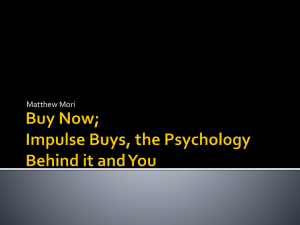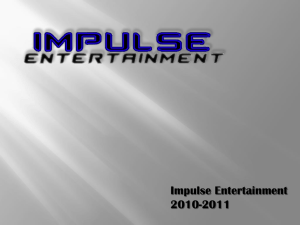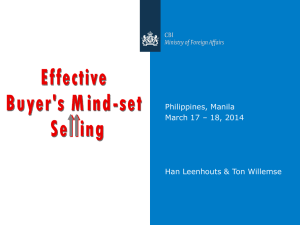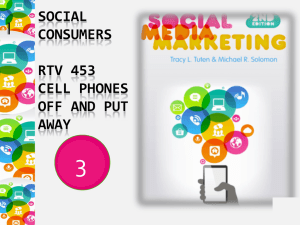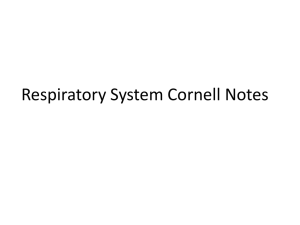Everyday We Fall `Victim` to an Impulse Buy
advertisement
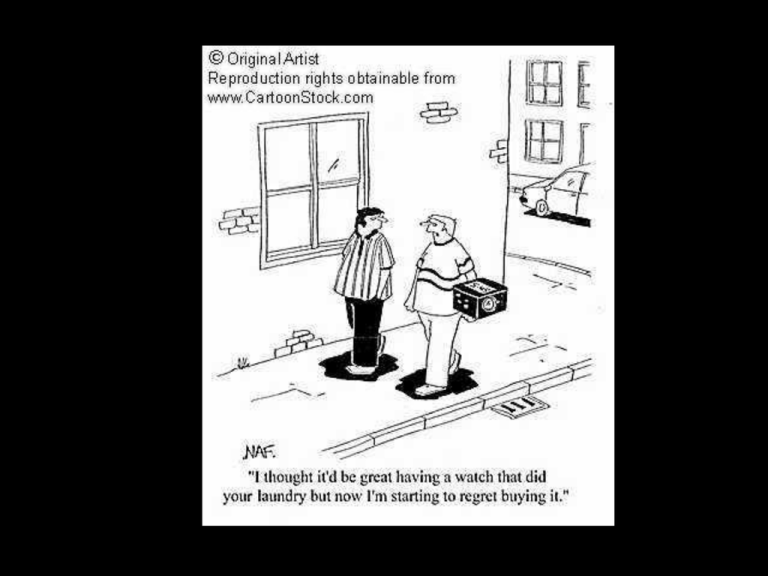
Everyday We Fall ‘Victim’ to an Impulse Buy Professor Warden NCKU IMBA Darcy Caskey David Chen Patrick Chen Consumer Behavior Jonathan Newton Florence Wu Contents What is an Impulse Buy? The Psychology The Servicescape A Layout that Encourages Impulse Buying Field Observations Conclusion Psychological Forces at Play The Reasons Behind Impulse Buying Impulse Buying at Work The Decision Still Lies with the Consumer What is an Impulse Buy? Psychological Forces at Play Yes, without realizing it, everyday we fall victim to an impulse buy. Whether it is a large expensive purchase or a small incidental one, we still do it! There has been a vast amount of research on the topic of Impulse Buying over the last twenty years that the number of definitions that currently exist border on infinite. Blackwell et. al. (2001) defines Impulse Buying as “a sudden and powerful urge to buy something immediately” and acting upon that urge. What is an Impulse Buy? This has been described by Statt (2001) as highly emotional and unconscious behavior. He justifies this statement by describing the sentiments that cause this behavior. They are namely: An unexpected urge to purchase something upon seeing it Intense motivational pressure stronger than all other considerations A feeling of euphoria or excitement Disregard of possible consequences Marketers and retailers have long been trying work out the right merchandising layout to encourage this sort of behavior. However, it is more difficult to spark than it seems. What is an Impulse Buy? Since impulsive behaviour is an emotion-dependent reaction each individual has different emotional triggers, personalities, tastes and preferences. It would be impossible to formulate a plan or layout that would appeal to all in-store customers and maximize their impulse buying behaviour. There have been major research developments in defining the consumer’s actual reasons for such behavior and also on optimal store layout. With this insight retailers may increase the possibility of such purchases but there is no guarantee that impulse buying will increase. The Psychology The Reasons Behind Impulse Buying Dittmar et.al. (1996) observed that consumption has become a means of self-expression, leisure and sometimes even a means of reward. Shopping and especially impulse buying gives people a certain amount of social gratification. Rook and Fischer (1995) state that impulsive buying often possesses an underlying bad connotation. On the other hand, they also state that many impulse buys are made purely with good intentions. Some appropriate examples would be: Impulse buys can often lead to feelings of guilt and cognitive dissonance once rationality has again set in. buying an incidental gift for one’s spouse or seeing something that a friend once mentioned was difficult to find. The reasons for this behaviour would naturally tend be rooted in the above mentioned need for self-gratification and reward derived from helping others. The Psychology Bayley and Nancarrow drew up a brief list of perspectives that cause an impulse buy. They are namely: Freud’s immediate gratification theory (basic instincts conquer logic) Existentialist theory (breaking worldly constraints) Social Constructionist Theory (building of one’s own self-image) New Cognitive Theory (simple relationship between need & solution) Economic Man Model (irrational & dysfunctional decision making) Based on the above research, impulse buying is an emotional decision which can be sparked by various psychological triggers. The Servicescape Layout that Encourages Impulse Buying The concept of a Servicescape was developed in 2000 by Johnson which he described as: “The physical and informational environment in which the sales and the service proposition are created and delivered. It is the creation of a working environment that provides clues and cues to customers and suppliers, internal and external about the organization, its operations, and its services.” When dealing with a retail outlet this pertains to the layout of the store that makes purchasing decisions easier for in-store customers. It has already been noted that there is no hard and fast solution that promises impulse buying, but it can still certainly be encouraged by an appropriate servicescape. The layout of a store can lend itself towards a sensory ambience that may stimulate certain buying behavior. Moreover, the actual in-store arrangement of merchandise is of strategic importance to encourage impulse buying. The Servicescape Statt states that only a minority of consumers, approximately one third, plan to buy particular products when they enter a retail outlet. They rely on the servicescape to provide them with cues and prompts on which brand to choose. This phenomenon can also stimulate impulse buying behavior. It is not uncommon for producers to pay stores for the appropriate physical positioning on their shelves. Certain products are more likely to be purchased on impulse. Research shows that incidental groceries like shampoo, toothpaste, magazines, soft drinks and candy rank amongst the highest. It is therefore no coincidence that some of these items are usually placed near the entrance or the check-out point in eye-catching displays. Research studies have shown that items placed at point-of-sales promotions are usually increased. Interestingly, once the display is removed the products ‘off the shelf sales’ return to normal. Point-ofSales is probably the most common form of encouraging impulse buying. Field Observations Impulse Buying at Work Following is a photograph in a convenience store of two children Also note to their right the positioning of the products. The height is of importance. just picked a product based on its packaging and placement. They are probably more intrigued by the presence of Snoopy on the outside of the box than the actual contents inside the box. All the candy and related goods are at eye-level and easy to reach for children of their age. This supports Judd McIlvain’s statement: “Kid’s cereal is placed lower on the shelves so the youngsters can see it and choose the box with the best characters or prizes.” Here is another example, candy in a department store is laid out at the perfect height for children walking by to just impulsively reach out and grab it. Of course the parents will have to pay for it later. The display also rotates and has lights that makes the display even more attractive to children. Field Observations The servicescape also influences adults. The following pictures are of a customer testing out a new Playstation 2 game. He then spotted the limited Winter Edition PS2. The service attendant informed the customer that Sony only manufactured a thousand of them. He was immediately interested even though he already had the original version. It is literally identical to the original except for color and obviously price. This customer ended up buying the Winter Edition PS2 after entering the store with the intention to purchase one CD-ROM game. When asked what he would do with the regular version at home he said he wasn’t sure but thought he might try to sell it on the internet. Field Observations The next picture is of people lined up outside a bakery in a department store awaiting a fresh baked goods. Not all the customers had specifically come to buy the bread. Some of them saw the line and became interested. When asked, they explained that the crowd and the smell attracted them so they decided to buy some themselves. This is a good example of how an event can catch the attention of customers, who then impulsively buy the product. Schreider also researched the use of store atmospherics to stir impulses. He explained: “Wafting aromas from … in-store recipe demos seduce and succeed as they trigger suggestion impulses.” Field Observations In the following photo, the customer was very interested in a MP3 player in front of him and bought it within minutes. After the sales people had left, we spoke with the customer. His reason was for being there was that his wife was on the 5th floor for an underwear sale. He felt embarrassed there, so he came up to browse and waste some time. His reasons for his purchase were that it looked very sophisticated and portable. Furthermore, when the sale’s staff informed him about its uses he was convinced. Note that he didn’t originally intend to buy anything and didn’t know how to actually use the iPod. His attention was drawn to the exhibition stand as he came out of the elevator. The Apple section is very attractively laid out and that caused him to stop where he spotted the tiny MP3 player. This lay out at the entrance is what sparked the impulse for him to ultimately make the impulse buy. Conclusion The Decision Still Lies with the Consumer Servicescape layouts and strategies explain how consumers can be enticed into making unplanned impulse purchases. Response to the presented stimuli is unpredictable. Research shows that while not every in-store customer can be moved to buy a specific product, a large number will be. The interviews, photographs and observations cited in this report support the fact that impulse buying is literally an everyday occurrence. our own human impulses, emotional and rational state at the time are the deciding factors but the servicscape still plays an important role in the arousal of these deciding factors. Impulse buying is ultimately the individual’s final decision, note that most websites on impulse buying are warnings to consumers against devious ploys by retailers/ marketers Most people in a retail outlet or department store intend to spend money on something. An impulse buy means that the individual didn’t intend on purchasing that sort of item at all. However, the intention on spending was still there and the underlying satisfaction behind impulse purchases is still desirable to the consumer. The decision lies with the consumer. With the modern day escalation in work and family pressures coupled with the continuous bombardment of advertising media and merchandising, it would be safe to assume that most consumers impulse buy nearly on a daily basis. Question & Answer
